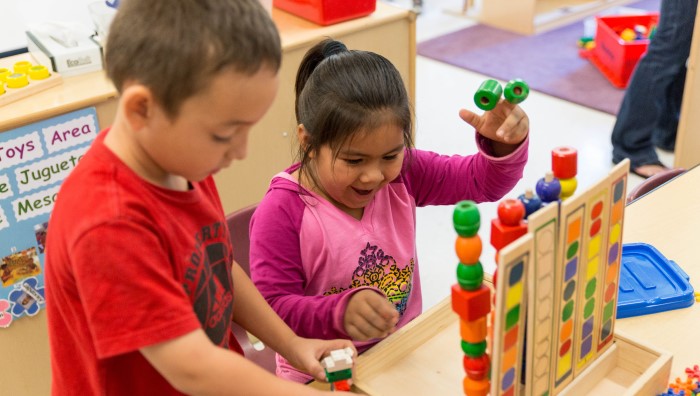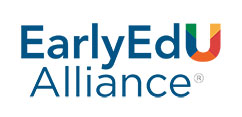Courses

EarlyEdU Alliance® Courses
The EarlyEdU Alliance’s competency-based courses in early childhood education combine theory and the latest research with students’ field-based learning. If a field-based setting is not feasible, observational videos from the Media Library serve as an alternative. Courses are available and free to all Alliance Member faculty affiliated with an institution of higher education. The Media Library is a resource available to all Alliance members. Alliance membership is free and joining is easy!
The EarlyEdU’s Competency-Based Educator Development Model (CEDM) approach to course and educator development leverages the powerful pedagogical strategies of video analysis, formative feedback, and collaborative learning to activate the Know, See, Do, Reflect, and Improve components of the Intentional Teaching Framework (ITF). Using direct practice with children as the inroad to developing knowledge, skills, and dispositions, the ITF contributes to developing student competence throughout each of our online and in-person courses. Our courses support teachers to know what to do in the moment, accurately see effective teaching in themselves and others, apply these practices in the classroom, and reflect with others on what works and what does not, and improve together with thoughtful practices. Incorporating the CEDM across early childhood coursework is a meaningful way to develop and improve teacher practice.
Alliance faculty have the opportunity to contribute to enhancing existing courses and adding new ones. In-person versions, with media-rich PowerPoints for classroom use, are available for all courses. Some courses have been developed for asynchronous online delivery. Most courses consist of 15 sessions that can be adapted for semesters, quarters, or other term lengths.

CEDM Components
ITF Components
All courses include:
- A complete syllabus, including learning objectives, a schedule of sessions and topics, and recommended readings
- Community of Reflection and Practice (CORP) assignments for students to reflect on their practices and observe and provide feedback on their peers’ work
- Competency-based assignments
- Videos of effective teaching practices
- Videos of experts in the field discussing their research
Online courses also have:
- Interactive knowledge checks
- Quizzes with built-in grading features
- Video lectures
- Embedded Coaching Companion assignments
- Discussions prompts
- Pre-programmed assignment rubrics
Competencies and Standards
EarlyEdU Alliance® courses are built around a set of course objectives. The objectives are mapped onto the NAEYC Professional Standards and Competencies for Early Childhood Educators for each course. Our course alignments also include an example of how the objectives align with one state’s (Washington) competencies. Substitute your state’s competencies and standards to see how EarlyEdU Alliance courses give your students the professional skills they need.
Available Courses
Some courses have also been developed for online asynchronous delivery. Please log into the Members Portal to order courses.
Foundational

In-person
Becoming a Teacher Leader
Participants learn to identify and reflect on their strengths, values, responsibilities, and goals in their roles as early childhood education professionals. Topics include tools and strategies for professional development, current standards and trends in early childhood education, and cultural competency. Note: This course focuses on ECE professionals’ work with colleagues, young children, and families. It does not address leadership in the context of advancing early childhood education within the community.

In-person
Online
Child Development and Brain Building
Participants will learn to identify children’s developmental trajectories. An emphasis on brain development will provide participants with a unique lens to apply in their early learning program. Participants will create early childhood environments that promote physical, language, social and emotional, and cognitive development. Explore the the key role that individual differences and family and socio-cultural context plays in development and learn strategies to build relationships that support each child’s individual development.

In-person
Online
Child Observation and Assessment
Addresses all stages of observation and assessment from planning and collecting information to analyzing data to inform teaching. Includes strategies for working with families and adapting assessment for children with disabilities and children who are dual language learners. Students work with checklists and data to practice assessment skills.

In-person
Online
Resilience and Wellness for Educators
Learn the positive skills, strategies, and routines that enable you to live a happy, fulfilling, and successful life and to positively adapt in the face of adverse or challenging circumstances. Topics include research about resilience, practices for cultivating resilience to become a more effective educator, and strategies specific to working in an early childhood setting. Ten-session course can be adapted for teaching during a shortened term or within another course.
Practice-Based

In-person
Child Guidance: Creating Caring Classrooms to Support Positive Behavior
This course utilizes evidence-based strategies for promoting social and emotional development and preventing and addressing challenging behaviors in children birth to age five. Through course readings, discussions, activities, and related experiences, participants will learn about a variety of these research-based practices. Participants will implement strategies that support and elicit their ability to provide positive behavioral support. Participants will reflect upon, analyze, and assess their classroom strategies related to positive behavior support, and then plan for improvement. This course is an update of the in-person Positive Behavioral Support for Young Children (updated September 2020).

In-person
Children’s Health and Well-Being
Explores topics related to health and well-being and focuses on teaching practices, classroom activities, partnerships with families, and program policies to ensure that all children are healthy and ready to learn.Topics include components of physical, mental, and oral health in early childhood; lesson planning that supports health and well-being, adapting health plans for children with special needs, and collaborating with families to promote optimal health. Handouts give students resources on working with families, injury prevention, nutrition, and more.

In-person
Online
Cognition and General Knowledge: Science, Math, and Logic and Reasoning
Designed to increase participants’ ability to implement strategies that support and promote logic and reasoning skills, math skills, and science knowledge in the early childhood classroom. Course covers evidence-based instructional practices that promote math and science learning in the early childhood classroom and includes an overview of young children’s use of logic and reasoning.

In-person
Online
Engaging Interactions and Environments
Covers interactions that support social and emotional well-being in well-organized classroom environments and high-quality instruction. Knowledge and skill in developing specific environments and interactions that support the development of children’s social and emotional, cognitive, and early academic skills. There are 2 options for offering this course: Online Part 1 (focuses on social and emotional support and the well-organized classroom), and Online Part 2 (focuses on instructional interactions). There is a revised in-person course covering ages birth-five, see Interactions & Environments: Engaging Children in Learning.

In-person
Executive Functioning and Approaches to Learning
Using the central organizing ideas of self-concept, engagement, and self-expression this course explores early childhood learners’ approaches to learning. Complementing our inquiry is research on diverse topics such as executive function, social and emotional development, cultural diversity, and individual differences as a means of understanding how children approach their learning and what you can do to support it in everyday settings for formal, informal, center-based, and home-based early learning.

In-person
Online
Family Engagement
This course focuses on the knowledge and skills that early childhood professionals use to develop relationships with families that support positive family and child outcomes. During this course, you will observe evidence-based practices and try out a variety of strategies. You will also reflect on your experiences related to family engagement and ways to support the development and growth of families and children. The online version is a 10-week subset of the in-person materials.

In-person
Highly Individualized Teaching and Learning
Participants will learn evidence-based research and practices for fostering the social and emotional, cognitive, and motor development of young children with varying needs and abilities in inclusive settings. Learn to individualize instruction, design learning environments with appropriate accommodations and adaptations, and understand IEPs and IFSPs.

Blended
Interactions and Environments
Covers interactions that support social and emotional well-being in well-organized classroom environments and high-quality instruction. Knowledge and skill in developing specific environments and interactions that support the development of children’s social and emotional, cognitive, and early academic skills.
This course is an update of the in-person Engaging Interactions and Environments (updated September 2020), and its blended format can be utilized for in-person and online learning.

Semipresencial
En español
Interacciones y entornos educativos
Este curso aborda las interacciones que apoyan el bienestar social y emocional en los entornos educativos bien organizados con la instrucción pedagógica de alta calidad. Provee conocimientos y habilidades en el desarrollo de entornos e interacciones que apoyan las habilidades académicas tempranas de los niños y las niñas, al igual que su desarrollo social, emocional y cognitivo.
Este contenido es una actualización del curso presencial de Interacciones y entornos educativos (actualizado en septiembre del 2020). Este formato semipresencial puede ser utilizado para impartir el contenido de manera presencial y virtual (en línea).

In-person
Online
Infant Mental Health
This is a survey course of infant and early childhood development that uses an infant and early childhood mental health (IECMH) framework. It focuses on risk and protective factors that may impact the development and well-being of infants, toddlers, and their families, as well as research-based principles and approaches to providing effective, relationship-based support.

Online
Learning Leaders in Early Childhood Education
Build your confidence and capacity as a leader in the early childhood profession using the 5Rs for Learning Leaders framework.

Online
Positive Behavioral Support for Young Children
Learn to utilize evidence-based strategies for promoting social and emotional development and preventing and addressing challenging behaviors in children ages 3–5. Topics include emotional literacy, classroom transitions, social information processing theory, and implementing behavioral support plans.

In-person
Online
Practice-Based Coaching
Introduces the components of Practice-Based Coaching (PBC) including planning goals and action steps, engaging in focused observation, and reflecting on and sharing feedback about teaching practices. Participants practice PBC with a teacher willing to serve as their coaching partner.
In-person
Online
Supporting Language and Literacy Development in Preschool
Unites theoretical knowledge of language and literacy development in young children with practical application of evidence-based strategies in early childhood settings. Topics include building vocabulary, phonological awareness, and supporting early writing.

Online
Supporting Multilingual Learners
This course is all about supporting children who are multilingual learners and their families in early childhood environments. Session topics include partnering with families, culture, language development, screening and assessment, language program models, interactions to promote literacy using “The Big 5,” and more. Woven throughout the course are ongoing opportunities for participants to reflect on issues of language as they relate to each area of study. Participants are given opportunities to design and implement activities that are responsive to the unique needs of children who are multilingual learners and their families, in addition to expanding their own capacity for advocacy and systems-level change.

